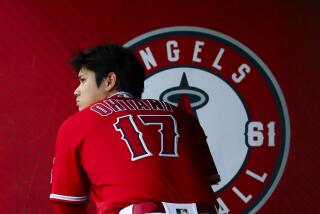Angels, Joyner Agree to 1-Year Deal Worth Minimum of $920,000
- Share via
Brushing aside two years of acrimony and a scheduled arbitration hearing on Monday, first baseman Wally Joyner and the Angels finally agreed to terms for the 1989 baseball season Friday, a one-year contract worth $920,000, plus incentive bonuses that could bring his salary to $1.1 million.
Friday’s announcement, which resolved the club’s last--and most visible--arbitration case, was a bit of an upset, considering that:
--A day earlier, both Angel Vice President Mike Port and Joyner’s representative, Barry Axelrod, had spoken pessimistically about the possibility of a settlement.
--A week earlier, Joyner had rejected a two-year Angel offer that would have paid him $965,000 plus incentive bonuses in 1989 and $1.275 million plus incentives in 1990.
On the surface, Joyner would appear to be settling for less--one year instead of two and $920,000 in base salary instead of $965,000, the figure he was seeking in arbitration.
Axelrod, however, pointed to the fine print when explaining why he was able to recommend the Angels’ latest offer to his client. The one-year proposal contains a more acceptable incentive-clause package, according to Axelrod, and lacks some of the unacceptable contract language that was in the two-year offer.
“The Angels, after a long time, finally exhibited a willingness to include makable performance bonuses,” Axelrod said. “Once they got that done, the rest of the deal took about 10 minutes.”
Makable is agent-speak for easily attainable goals. Or, at least, more easily attained than winning the most-valuable-player award or being named to the All-Star team, the only incentive bonuses that were included in the Angels’ two-year offer.
Those incentives are part of the contract Joyner signed, but only part. Joyner, who appeared in 156 games in 1988, also wanted the inclusion of bonus awards for games played, which Port granted him in the restructured contract. Joyner can earn an additional $55,000 if he appears in 150 games this season.
Said Axelrod: “If (Joyner) plays the number of games he has averaged during his first 3 seasons (153), he will have earned both of his performance bonuses. And that should place him in the $1-million range.”
The entire incentive package, which also includes payment for winning Gold Glove and Silver Bat awards, is believed to total $175,000.
Joyner had also objected to the language of the two-year offer, specifically that concerning the 1990 season. Because of a possibility of a player strike, many teams are requesting that “lockout language” be written into 1990 contracts--stopping payment in case of a player lockout.
Axelrod said that Joyner is better off signing for one year, gambling that he will have a strong season and then can seek another one-year contract through arbitration in 1990. Contracts for the 1990 season awarded by an impartial arbitrator, according to the Major League Baseball Players Assn., are not subject to lockout language.
“The only recourse we have is to arbitrate (in 1990),” Axelrod said. “We felt Wally would be best served by continuing to play at the level he’s been playing at and taking his chances next year.”
Arbitration in ‘89, however, was not the answer Joyner wanted. He had filed at $965,000 and the Angels at $750,000 and although a Joyner victory seemed likely, he and his representatives decided not to chance it.
“It’s always a risky situation,” Axelrod said. “You’re putting your fate into the hands of a third party who may not be well versed on the intricacies of baseball, or may have decided three times in a row for the player and now figures the owners are due for one.”
So, for the first time in two years, Joyner did. Last spring, his contract was automatically renewed by Port at $340,000. Joyner, who staged a mini-holdout before reporting to training camp, had been seeking $400,000.
In 1987, he also feuded with Port. Seeking $200,000 after his all-star rookie season, Joyner threatened to walk out of camp before reluctantly signing for a base salary of $165,000.
Thus, for the first time as an Angel veteran, Joyner will enter spring training in 1989 reasonably content.
Joyner, who was visiting relatives in Florida, couldn’t be reached for comment, but Axelrod described him as feeling “pleased, relieved.”
“Really, this is the first time he’s been able to go into spring training and get into the right mental framework, work on swinging the bat and fielding his position without worrying about a contract controversy,” Axelrod said. “In retrospect, I think that had an effect on his season last year.”
In 1988, Joyner had just 1 home run and 6 RBIs in April and didn’t hit his third home run until June 12. He finished the season with 13 home runs and 85 RBIs, down from 34 home runs and 117 RBIs in 1987.
Before Joyner, Port signed outfielder Chili Davis and shortstop Dick Schofield to three-year contracts and signed third baseman Jack Howell, outfielder Tony Armas, catchers Bill Schroeder and Darrell Miller and pitchers Kirk McCaskill, Greg Minton to one-year contracts.
More to Read
Go beyond the scoreboard
Get the latest on L.A.'s teams in the daily Sports Report newsletter.
You may occasionally receive promotional content from the Los Angeles Times.






